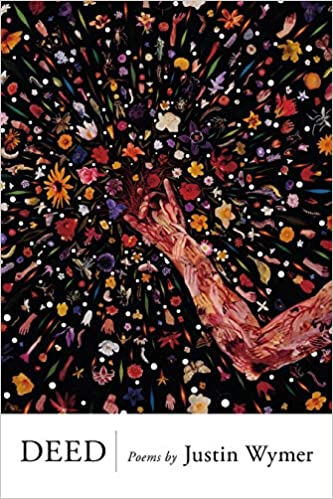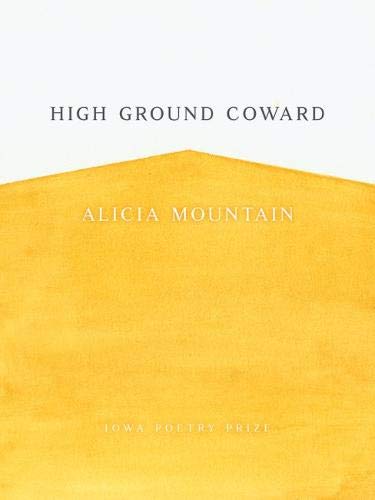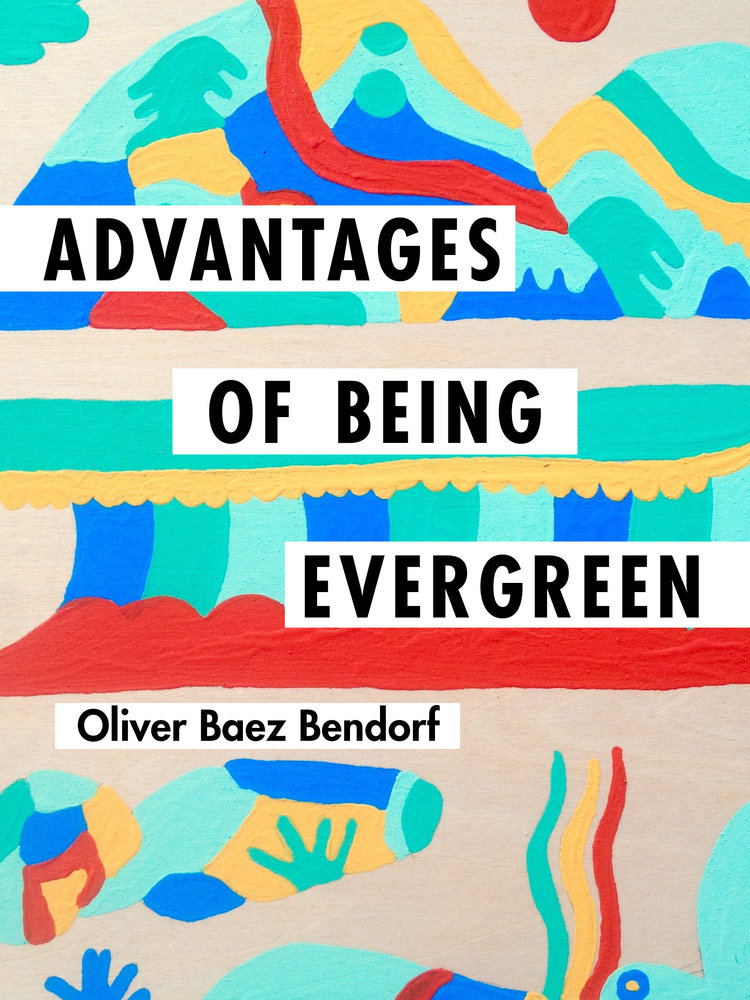QUEER AND TRANS POETIC ECOLOGIES: THREE POETS CHALLENGING THE PASTORAL TRADITION
By Luiza Flynn-Goodlett
Advantages of Being Evergreen, Oliver Baez Bendorf (Cleveland State University Press, 2019, $16, 70 pgs.)
High Ground Coward, Alicia Mountain (University Of Iowa Press, 2018, $19.95, 100 pgs.)
Deed, Justin Wymer (Elixir Press, 2019, $17, 120 pgs.)

Contemporary queer and trans poets Alicia Mountain, Justin Wymer, and Oliver Baez Bendorf, speak back to a canon that prefigures nature either as untouched idyll or as bastion of rugged heterosexual masculinity. Going beyond the expected urban confines of gay literary tradition, these poets strike out toward a wilderness that bears no resemblance to the Romantic’s rustic purity or Whitman’s ecstatic collective American consciousness. Instead, each collection sees the embattled vestiges of the natural world both as a testament to and handbook for survival. Despite humanity’s violent eradications and incursions, obsession with taming and naming, and endless distortions of pathetic fallacy, nature continues to wordlessly sprout and blossom. Though their geographical settings are different—Bendorf in the South; Mountain in the Midwest; and Wymer in Appalachia—each poet draws lessons from nature’s resilience, urging readers to germinate in abandoned lots and graveyards, making an Eden of what is wild, deathless, and mysterious.
While being careful not to conflate the reality of environmental devastation with the violence of transphobia and homophobia, these queer and trans poets do utilize the liminal position of queerness in order to plumb tensions between the human world and the natural one. In Alicia Mountain’s debut poetry collection, for example, nature is cold and abbreviated. She articulates this coldness through images of the garden: a space where human will and wilderness collide. She writes, “Nothing against the garden. / Nothing against the weeds therein. / / Disarray knows how to bide its time.” Nature, represented by “the weeds,” inevitably intrudes, and its obscure designs unravel what is orderly and conventional into glorious “disarray.”

Justin Wymer also comments on human intervention in nature in his collection, Deed. “I once caused / a violet to bud twice in winter. That isn’t enough,” the speaker states, admitting that American society’s reflexive ways of relating to nature—taming, cultivating, controlling—are insufficient, and there may be a more authentic mode by which to approach the natural world. The question is whether this mode can be consciously accessed, or, as Wymer suggests in “Bouquets,” if nature only yields its bounty when human bodies are unhitched from consciousness: “The dead tug at bulbs, / gathering inverse bouquets / in the liquory dark.” These nascent “bulbs” represent unrealized possibility. They can only be gathered by the dead, only under the cover of darkness. These barriers allude to the fact that puritianical, capitalist societies keep individuals from accessing nature, desire, and the self simultaneously.
But what happens when the living pass from the garden—where nature is pruned, cultivated, and domesticated—into the forest where trees communicate through fungal networks and follow an ancient, obscure logic? These poetry collections represent refuge from the binaries imposed by society; a refusal to be pruned into more “acceptable” shapes. For example, in Wymer’s Deed, the wilderness—where all life is interconnected and in harmony—reflects and reifies the speaker’s own essential wholeness. Wymer writes: “I think myself wheat-colored. Queer. The plants / no longer seem to moan.” Through the juxtaposition of the description “wheat-colored,” and “queer,” Wymer suggests a relation or a sameness between the behaviors of the plant and the person. Together, they emphasize the gender fluid natural world’s frank self-expression. This relationship is mutually beneficial, as the connectedness between the speaker and the wheat allows nature to stop calling out, or to “no longer moan.”
Similarly, Mountain writes in High Ground Coward, “I am the snake and I am the silence, / an animal’s rib picked clean.” Both the snake, the ribs, and the speaker are whole unto themselves, and yet, part of a greater whole. By defining the speaker’s identity as these natural elements combined, Mountain refuses to warp the animal or the human with pathetic fallacy, revealing a harmony that is only “silent” because it defies any expectations of self-expression.

Unfettered by anthropocentrism, these poets map a new territory of connection and becoming, in concert with—rather than in opposition to or idealization of—the natural world. Bendorf’s Advantages of Being Evergreen, for example, written in the wake of the 2016 election, explicitly engages with this idea of nature as a mirror, a realm beyond language where the self can unfurl. In “Rainwater From Certain Enchanted Streams,” he writes: “Me suckling through my own prow, family of foxes making yips & howls the others can hear emanating from the woods.” In this collection, transfiguration is not only possible, but imperative. Just as fox pups are born each spring, the speaker is empowered to follow the edicts of their inmost self into each new season of life.
Baez-Bendorf’s collection also sanctifies transfiguration, comparing testosterone injections to holes in a universe. In “Faggot Turf,” he writes, “We poke / our dusty thighs with / needles, we pour / ink into the holes— / / hemlock and lava rock, / make ourselves / a universe that way.” Both “hemlock” and “lava rock” are agents of destruction, but also of renewal—the hemlock flowering in the woods, and the lava cooling to rock and forming new land. Bendorf equates the “we”—“our dusty thighs”—with these natural elements that are remade through a process of destruction.
In all three collections, nature offers an exit through which queer and trans writers and readers can truly see themselves reflected, not only outside of societal oppression, but also beyond the myopic, isolating egoism of individual consciousness. Once freed of human ego and guile, nature offers us the opportunity to turn, gently, toward each other, as in Wymer, “bones, after the great melt, / turn a little to make room for softer— / cutting flower-shapes, / throat-shapes, in the warming soil.” And, for Bendorf, these connections deepen our capacity for tenderness, “for / all of us / bearded mon- / sters to know / we can be / soft too, loved too.” Ultimately, none of us can abandon society entirely (as appealing as that sounds), but as these queer and trans poets demonstrate, the natural world may serve as ballast when adrift in humanity’s small-minded cruelties. We can follow nature’s example, as Mountain writes, by being nothing but fully ourselves—“Body exalt. / Ozarks exalt.” And, though Bendorf admits “there is / much to cry about,” we can spend time with these poets’ words, and finding lives given meaning as an expression of the awe-worthy, ever-renewing, multiplicity of the universe. We can choose, along with Bendorf, to “look up, look all the way up, / look up, look up, look up, we look / up, up, up.”
Luiza Flynn-Goodlett is the author of Look Alive—a finalist for numerous prizes, including The National Poetry Series, and winner of the 2019 Cowles Poetry Book Prize from Southeast Missouri State University Press—along with seven chapbooks, most recently The Undead, winner of Sixth Finch Books’ 2020 Chapbook Contest, and Shadow Box, winner of the 2019 Madhouse Press Editor’s Prize. Her poetry can be found in TriQuarterly, Third Coast, Pleiades, and elsewhere. She serves as editor-in-chief of Foglifter in sunny Oakland, California.
Oliver Baez Bendorf works with language to imagine new possibilities for gender and nature. He is the author of two collections of poems, Advantages of Being Evergreen (CSU Poetry Center, 2019) and The Spectral Wilderness (Kent State U., 2015). He is a recipient of a National Endowment for the Arts grant (2021) and the Betty Berzon Emerging Writer Award (2020) from The Publishing Triangle. He has been a Fellow at Vermont Studio Center and the Wisconsin Institute for Creative Writing, where he held the Halls Emerging Artist Fellowship (2017-2018). He is a CantoMundo fellow. His writing has appeared in recent or forthcoming issues of American Poetry Review, BOMB, Orion, Transgender Studies Quarterly, and elsewhere. Born and raised in Iowa City, Iowa, he is currently an assistant professor of creative writing at Kalamazoo College in Michigan.
Alicia Mountain debut collection, High Ground Coward (Iowa, 2018), was selected by Brenda Shaughnessy to win the Iowa Poetry Prize. She is also the author of Four in Hand (BOA Editions, forthcoming early 2023). Her chapbook, Thin Fire (BOAAT Press), was selected by Natalie Diaz. Dr. Mountain was a Clemens Doctoral Fellow at the University of Denver and is the 2020-21 Artist in Residence at the University of Central Oklahoma. She is a lesbian poet, based in New York City. Keep up with her on twitter at @HiGroundCoward.
Justin Wymer is a poet, scholar, and educator. Born and raised in southwestern West Virginia, he holds degrees from Harvard University and the Iowa Writers’s Workshop. Currently, he resides in Denver, where he is pursuing a PhD in creative writing and literary arts with a focus on trauma studies and literature of excess and difficulty. Wymer’s debut full-length collection, Deed, won the 2018 Antivenom Poetry Award, chosen by Jennifer Franklin, and will be published by Elixir Press in 2019.
